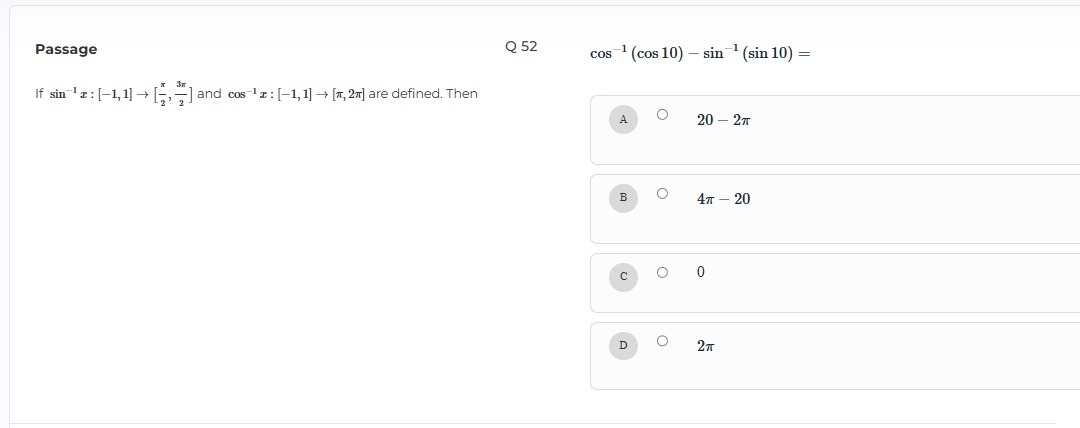Question
Question: If $\sin^{-1}x: [-1,1] \rightarrow [-\frac{\pi}{2}, \frac{3\pi}{2}]$ and $\cos^{-1}x: [-1,1] \righta...
If sin−1x:[−1,1]→[−2π,23π] and cos−1x:[−1,1]→[π,2π] are defined. Then
cos−1(cos10)−sin−1(sin10)=

20−2π
4π−20
0
2π
0
Solution
Given the definitions:
- sin−1x:[−1,1]→[−2π,23π]
- cos−1x:[−1,1]→[π,2π]
We need to evaluate cos−1(cos10)−sin−1(sin10).
Step 1: Evaluate cos−1(cos10)
Let y2=cos−1(cos10). We need y2∈[π,2π] such that cosy2=cos10.
The general solution for cosθ=cosα is θ=2nπ±α, where n∈Z. So, y2=2nπ±10.
We know π≈3.14159 and 2π≈6.28318. The range is approximately [3.14,6.28]. Let's test values for n:
-
If n=0, y2=±10. Neither 10 nor −10 is in [π,2π].
-
If n=1, y2=2π±10.
- 2π+10≈6.28+10=16.28 (not in range).
- 2π−10≈6.28−10=−3.72 (not in range).
-
If n=−1, y2=−2π±10.
- −2π+10≈−6.28+10=3.72. This value is in [π,2π].
- −2π−10≈−16.28 (not in range).
So, cos−1(cos10)=10−2π.
Step 2: Evaluate sin−1(sin10)
Let y1=sin−1(sin10). We need y1∈[−2π,23π] such that siny1=sin10.
The general solution for sinθ=sinα is θ=nπ+(−1)nα, where n∈Z. So, y1=nπ+(−1)n10.
We know −2π≈−1.5708 and 23π≈4.7124. The range is approximately [−1.57,4.71]. Let's test values for n:
- If n=0, y1=10 (not in range).
- If n=1, y1=π−10≈3.14−10=−6.86 (not in range).
- If n=2, y1=2π+10 (not in range).
- If n=−1, y1=−π−10 (not in range).
- If n=−2, y1=−2π+10≈−6.28+10=3.72. This value is in [−2π,23π].
- If n=3, y1=3π−10≈9.42−10=−0.58. This value is also in [−2π,23π].
We have two possible values for sin−1(sin10): 10−2π and 3π−10.
In such cases, when multiple values satisfy the condition within the given range, the problem implicitly expects the value that makes the overall expression consistent or unique. Given the options, if the answer is 0, it implies that sin−1(sin10) should be equal to cos−1(cos10).
Both 10−2π and 3π−10 are valid outputs for sin−1(sin10) as they lie in the specified range and have the same sine value as sin10.
10−2π≈3.7168. 3π−10≈−0.5752.
If the question is well-posed and has a unique answer among the options, it suggests that the intended value for sin−1(sin10) is 10−2π.
Step 3: Calculate the difference
cos−1(cos10)−sin−1(sin10)=(10−2π)−(10−2π)=0.
The final answer is 0.
